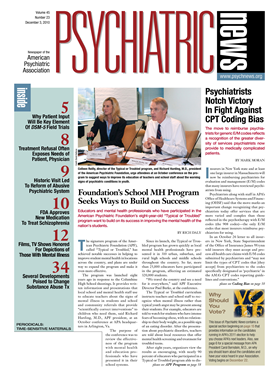Psychiatrists and other physicians volunteering their medical expertise at community health centers might not need to worry about obtaining malpractice insurance if a federal legislative proposal to provide liability protection for such care becomes law.
However, the path to enactment for the Family Health Care Accessibility Act (HR 1745), which was approved by a House of Representatives panel in July, could be complicated by new estimates that set its price tag at more than twice as high as originally thought.
The Congressional Budget Office released an estimate in September that concluded that the proposal would cost about $18 million over five years, significantly higher than its sponsors' initial estimates of $7.5 million over that time. The bill's cost is based on estimates of the federal government's paying for the defense of any clinician facing a lawsuit relating to care at a community health center and paying proven claims.
Even with the higher price tag, supporters maintain that the legislation would bolster the substantial taxpayer saving already derived from these health centers. The federal government saves nearly $18 billion a year by providing care through the health centers, instead of having to fund much more costly emergency-room care for indigent patients.
Moreover, supporters said they are still optimistic about its outlook for passage due to its bipartisan support—unusual in the current Congress—and the increasingly important role of community health centers in providing care to indigent Americans.
Rep. Tim Murphy (R-Pa.), a psychologist, sponsored the legislation and teamed up with Rep. Gene Green (D-Texas) to support physicians, especially retired ones, who want to volunteer to provide medical care at those health centers and may face substantial malpractice costs to do so, depending on their specialty area. Such costs can deter clinicians from volunteer work.
“It is extremely important to the community health centers in my area and across the country to be able to bring on licensed medical practitioners willing to volunteer their time with the support of federal liability coverage,” said Green in a written statement.
Additionally, the centers have taken on a large and growing role in the public health care safety net under the health care reform law enacted earlier this year. That measure increased funding for community health centers by $11 billion and required them to provide care for up 40 million patients by 2015, which would double their current capacity.
The measure would amend the Federal Tort Claims Act, which provides liability protection to employees and contractors of federally funded health centers because they are considered federal employees. That protection would be extended under the bill to clinicians who volunteer at the health centers.
“Although the amount of patients at community health centers is rapidly growing, the number of physicians available to treat these patients is decreasing,” Murphy said after a subcommittee approved the legislation in July.
He pointed out that some community health centers report they are unable to fill up to 20 percent of their staff physician positions. Additionally, in 2009 more than 3,400 positions for primary care physicians were unfilled, stressing a system that is already far short of the capacity needed to treat the low-income people who depend on these health centers—70 percent of whom have incomes below the federal poverty level.
The health center legislation can be accessed at <http://thomas.loc.gov> by searching on the bill number, HR 1745. 
